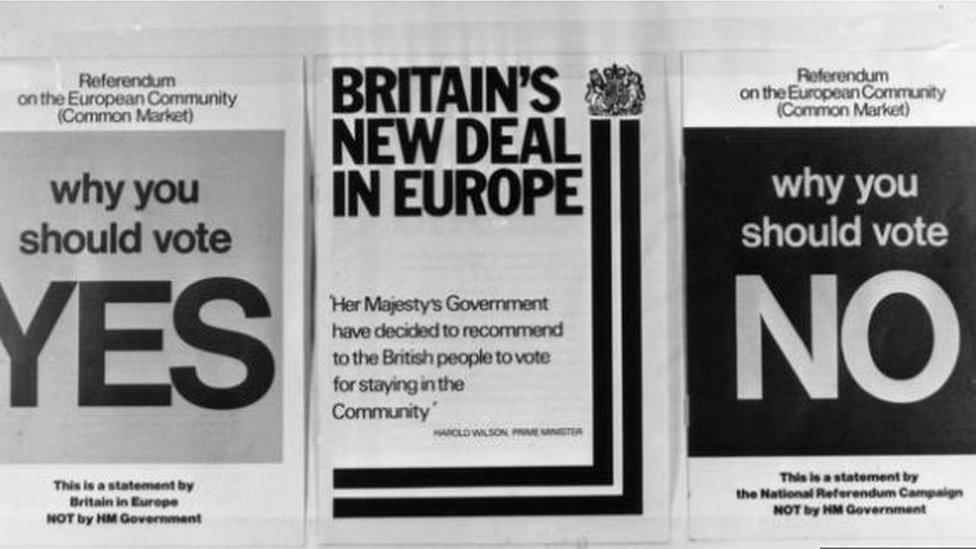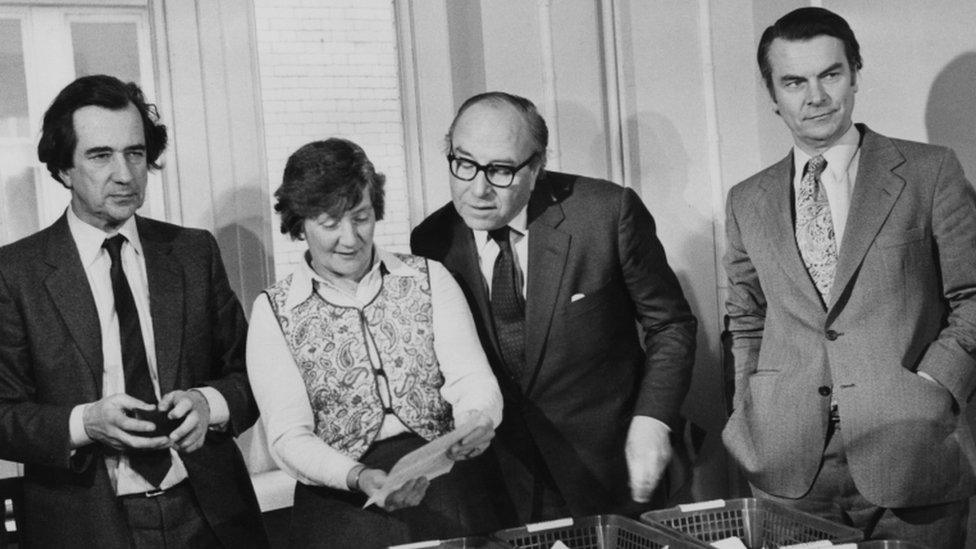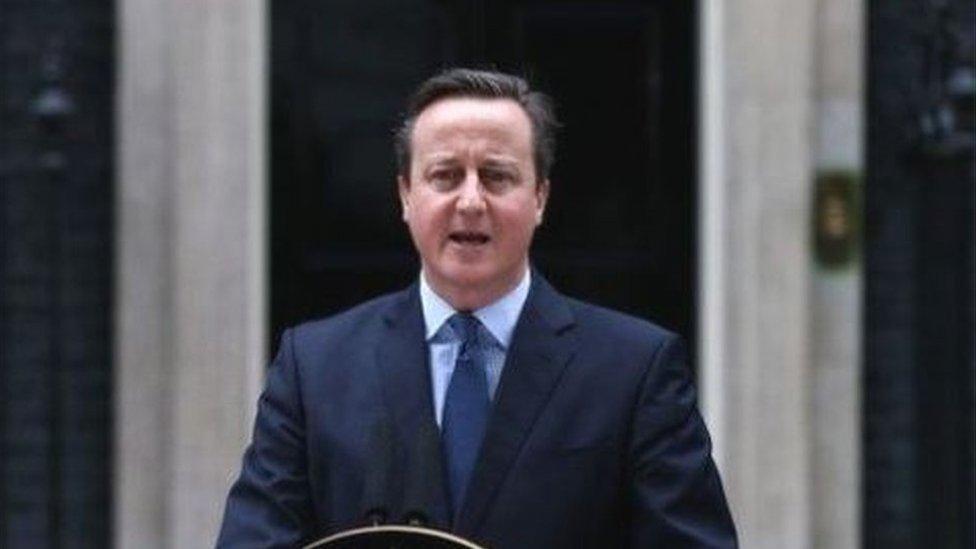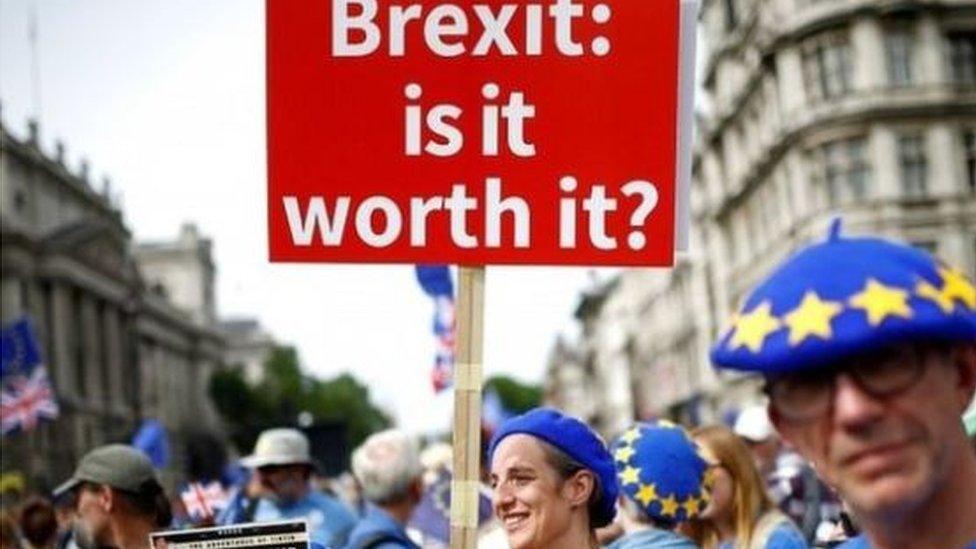How Brexit could redraw Midlands political battle lines
- Published

"Europe: journey to an unknown destination"
This was the title of the BBC's Reith Lectures delivered in 1972 by the political economist Andrew Schonfield. It helped to set the scene for Britain's entry the following year into what was then the European Economic Community.
As an undergraduate student of politics, I lapped-up Schonfield's narrative: the UK was on track for some kind of epic "supranational" transformation. But into exactly what were we to be transformed? It was one thing to get on the bus, another altogether to agree the route and where it should take us. Come what may, it would be a fascinating experience to take the ride.
It has certainly helped to keep us politics-watchers gainfully employed for 40 years or more. But its progress has been very different from that predicted by Schonfield. A succession of tortuous European summit conferences, hotly-contested treaty changes and British government crises has taken us along a relentlessly bumpy road towards today's much-enlarged political union.
As an ultimate destination, Brexit is the exact opposite of Schonfield's theoretical direction of travel. And yet, by some strange irony, it gives a new resonance to his headline. "Journey to an unknown destination" is even more relevant at the moment of our leaving, than it seemed then when we entered. It signposts a future in which our politics may never be the same again.
Our two-party mould
Over the years, I have tended to pour cold water over excitable predictions of a fundamental political realignment.
Back in the 'eighties, even with the help of some of the top talent drawn from the Labour and Liberal parties, the Social Democratic Party failed to "break the mould of British politics". After some notable early highlights, it took just seven years for "the gang of four" and the rest to admit defeat. By 1988, it was the SDP who were broken, while the two-party mould was obstinately refusing to crack: four consecutive terms of Conservative majority governments were followed by three Labour administrations.
Maybe my scepticism has been shaped by my experience of a part of the country that is a prime example of two-party politics. For more than half a century, neither the Liberal Democrats nor the Liberals before them have held more three seats at any one time in a West Midlands region boasting over 60 constituencies.

UKIP have undoubtedly left their mark on our recent European history: they scored their biggest successes in the 2014 European Parliamentary Election and in local elections in the Black Country and Stoke-on-Trent around that time. Remember it was they who coerced David Cameron into the "in-out referendum".
But now they look increasingly like a magnesium flash which sparked brightly, but briefly, only to fall away.
A shock to the body politic
So what would it take for me to change my mind about the chances of that "fundamental political realignment"? I reckon it will take the most tremendous trauma, an enormous knock, to break that mould once and for all.
But Brexit may just be exactly such a shock.
I mentioned in last week's blog post how it is a debate which cuts through the two biggest parties as much as it does between them.
During the early 'nineties, I reported on the deep-seated divisions in the Tory party between the "irreconcilable" Eurosceptics, including Bill Cash, then the MP for Stafford and now for Stone, and Euro-enthusiasts headed by the Rushcliffe MP Kenneth Clarke: (at that time my politics brief covered both the East and West Midlands together.) The crisis triggered by the Maastricht Treaty nearly brought John Major's government down. The Wolverhampton South West MP, Nicholas Budgen, was among 22 Tory backbench Eurosceptics who were suspended from their Parliamentary party for voting against the government.
More recently those same Tory fault lines were another principal reason why David Cameron felt compelled to call that referendum.

But Labour have divisions of their own, as the self-same Kenneth Clarke pointed out during last week's Prime Minister's Questions.
He suggested to Theresa May that if she comes back with a compromise deal agreed with the European Union: "It would retain the support of pro-European Conservative backbenchers and also win the support of a significant number of Labour pro-European backbenchers, which would reveal the hard-line Eurosceptic views of the Bennites on the Labour front bench and the right-wing nationalists in our party are a minority in this House."
Is it fanciful to suppose either or both of the main parties might fracture along these lines?
Just imagine.
What if Mrs May's "good deal for the United Kingdom" were, somehow, to pass through Parliament with the support of, say, 15 Labour MPs: enough to counteract the opposition both of the Tory Brexiters and of the Labour leadership? Speculation is mounting already that Labour backbenchers including Wolverhampton's Pat McFadden and the Stoke MPs Ruth Smeeth and Gareth Snell might be prepared to support such a deal even if it meant defying their party line.
Mr Snell said this week: "I'm not wedded to opposing a deal just because it comes from the government. If the deal is as May has been suggesting then it would be difficult for me to justify to myself not strongly considering supporting it, if the alternative is crashing out without a deal."
Consider how this might deepen divisions on both sides of this debate in both main parties. Might this have the effect of driving an unholy alliance of the more Euro-friendly Conservative and Labour MPs into something longer-lasting?

Maybe the People's Vote campaign might also serve to define a new party political landscape.
But where would this leave those hardened Brexiters who, like Sir Bill Cash, remain as 'irreconcilable' as ever?
Who knows? Only when, or if, that trade deal materialises can the picture start to emerge.
Stourbridge's Conservative MP Margot James (now the Minister of State at the Department of Digital, Culture, Media and Sport) was the only Midlands MP to declare herself a "Remainer" even before David Cameron had finished traipsing around the capitals of Europe in pursuit of his "renegotiated terms of membership".
She and Pat McFadden (see above!) will both be joining me in the studio for this weekend's "Sunday Politics Midlands". And I hope you will too, at 11.00 on BBC One this Sunday, 21 October 2018.
And finally: what price a sequel to that original series of BBC Reith Lectures? "Brexit: Journey to another unknown destination"?